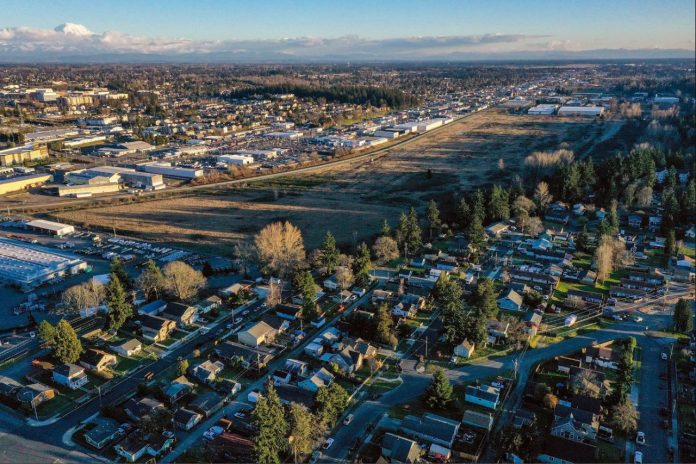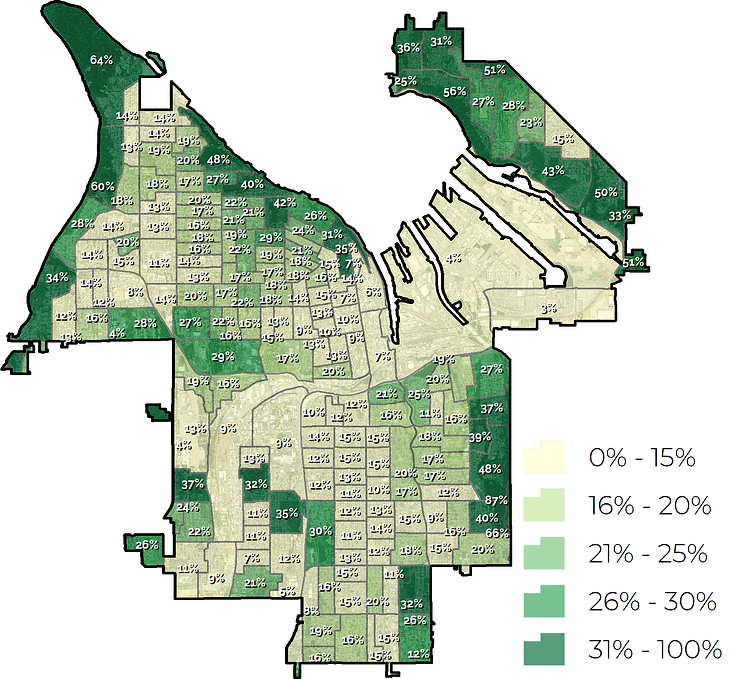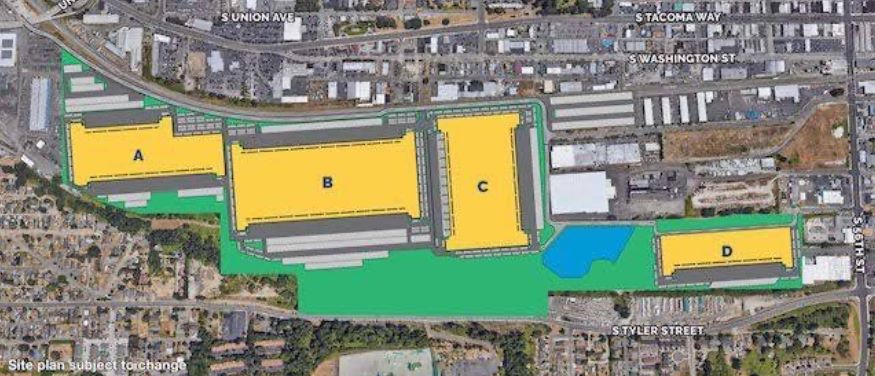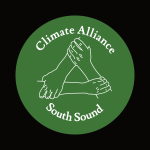
South Tacoma faces the threat of a warehouse complex that would exacerbate air pollution, extreme heat, and violent crime.
It’s no coincidence that the already overburdened community of South Tacoma is the planned site of a warehouse complex that would pave more than 125 acres of its remaining wetlands. This 2.5-million-square-foot mega warehouse would be both a symptom and a cause of worsening social, economic, and environmental injustice in Tacoma.
South Tacomans already breathe some of the worst air in the city, and this warehouse would bring an estimated 8,000 more vehicle trips through South Tacoma neighborhoods every day — a sizable fraction of the current vehicle rate. This strain on the local infrastructure would also be accompanied by a transfer of control of some of that infrastructure to developer Bridge Industrial — which lacks any experience of operating in a residential area. Besides respiratory diseases and cancer, air pollution from vehicle exhaust with higher rates of violent crime in the surrounding area. More 18-wheelers driving past three South Tacoma public schools will not help any of our city’s problems.
Even now, before construction has taken place, we’re seeing the impacts of this warehouse on our home. As of this year, the City of Tacoma has implemented a city-wide camping ban as well as continuous sweeps of the potential warehouse location. Desperate, with their meager belongings trashed, our houseless community members are pushed out of the forest cover and into neighborhoods to try to survive. With more visibility and no space to legally occupy, they are harassed by cops, their housed neighbors, and other unhoused people. Increased complaints of crime in previously quiet neighborhoods around the warehouse site have followed.
South Tacoma already has the city’s lowest percentage of tree canopy cover and highest percentage of oppressed nationalities, and yet the city is actively planning to reduce that canopy. Trees and wetlands cool an area down significantly, while adding more pavement does the opposite. Reducing tree cover would worsen health outcomes and could also result in an increase in violent offenses, both because rising average temperatures and the scarcity of green space have been linked to violence.
It’s systemic
The relationship between green space and violent crime can be partially ascribed to the fact that neighborhoods with more green spaces also disproportionately have White populations, higher average income, and more economic opportunity. Rent is inherently cheaper in polluted areas, which draws in poorer, and often heavily non-White populations. Those that can afford to leave an environmentally devastated area do so and take their wealth with them, while those that remain breathe poison and fight for scraps.
There is more tax revenue to lose in upper-class neighborhoods than in working-class ones, so it’s cheaper for a city to put the brunt of the climate crisis on the most overburdened communities – who have the fewest resources to resist. Capitalism exacerbates inequity at an exponential rate.

This warehouse project is shaping up to be a textbook example of these mechanisms: the area is historically red-lined, known for its crime, and has 9% tree canopy cover. The City and Bridge Industrial chose this location because it’s cost effective and they think they can get away with it. They think that this working-class community is too squeezed to fight back.
The struggle for South Tacoma
City officials quietly approved Bridge Industrial’s construction plans in April 2023, after completely disregarding the voices of South Tacoma residents for over a year. Since then, we have been silenced, stonewalled, and lied to. Like a game of hot potato, our city and state governments pass accountability for this development back and forth as quickly as they can.
The City of Tacoma has been astonishingly unwilling to conduct standard research on the health and environmental impacts of this massive project.
Tacoma city government permitted construction under a Mitigated Determination of Non-Significance. A Determination of Significance would have required the city to do a full analysis of potential harms in an Environmental Impact Statement before moving forward with permits. Given the obvious potential for significant impacts to our health and environment, it seems that the City knows the results would hinder the warehouse plans. This is an open admittance by city officials that they see the residents of South Tacoma as insignificant.
South Tacomans represented by Earthjustice, 350 Tacoma and the South Tacoma Neighborhood Council appealed on behalf of residents. Unfortunately, the Hearing Examiner upheld the decision. These groups expressed frustration that any arguments about equity, environmental justice, and disproportionate health impacts were not allowed to be heard during the legal proceedings. Apparently, these key areas are not part of our State Environmental Policy Act, which determines which projects can obtain permits and proceed.

Despite these gaping flaws in our permit regulations, the City of Tacoma made decisions that demonstrate that they value the profits of industry over the wellbeing of the human and non-human lives placed in their care. Early on in the permit process, a handful of government agencies wrote letters to the City noting that there were environmental justice concerns, that the community already suffered from pollution-related impacts, and that a proper Health Impact Assessment should be conducted.
These letters and hundreds of public comments were ignored. Inaccurate and incomplete permit submissions by Bridge Industrial were accepted without scrutiny. And when the first traffic Impact Analysis showed over 8,000 additional vehicle trips per day through the neighborhood streets — an amount that might trigger a deeper analysis of the project — the City gave the consulting agency narrowed parameters and asked them to do it again — this time magically getting just below 5,000 vehicles, the amount that would trigger the deeper analysis.
As the City’s facade of environmental concern and care for its citizens erodes, their priorities become painfully obvious. We are subjected to the financial interests of a giant corporation that was encouraged by our city officials to build any old monstrosity in our backyard.
What it is to be done?
The people of Tacoma have spoken – and until the city chooses to listen to those it exists to serve, our voices will become louder and more numerous. The City tried to do this quietly because they are afraid of the power of an informed and coordinated populace. The working class is the lifeblood of any city and when we unite, we win. City officials’ blatant disregard for residents’ lives will cost them the consent of those they depend on to keep the city functioning. Defeating the warehouse is just a matter of uniting and activating our community to harness the power we already have. Growing numbers of residents and allies are working together to stand up to Bridge Industrial and to tell them to keep their hands off our home.
Climate Alliance of the South Sound (CASS) opposes the construction of this warehouse complex because we know it will make South Tacoma lives worse. Our concerns are substantiated by the impact analysis the city refuses to perform, and by the rest of capitalism’s racist history. The working class of Tacoma demand that the City require a Health Impact Assessment and that Bridge Industrial do the right thing: recognize the damage this would do to the neighborhood, acknowledge the environmental racism involved in choosing South Tacoma, and pull out of the plans for the mega warehouse.
Climate Alliance of the South Sound (CASS) is an organization dedicated to empowering, organizing, and mobilizing South Sound communities to improve our living conditions through environmental action.

